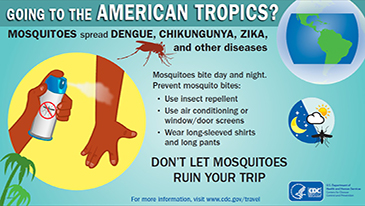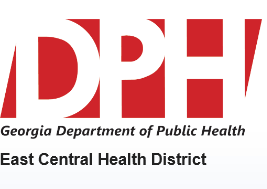What is Zika virus?
Zika virus (pronunciation: zee-kah) is a viral disease that is transmitted to people by mosquitoes. Prior to 2015, outbreaks have occurred in Africa, Southeast Asia, and islands in the Pacific Ocean. In May 2015, Zika virus transmission was confirmed in Brazil and outbreaks are currently occurring in many countries. Zika virus is not currently transmitted in the United States, but travelers returning from areas where the virus is being spread may become sick after returning home to the US. There is a risk that the virus will be imported to new areas by infected travelers. A list of countries where Zika virus is currently being spread can be found at the CDC website http://www.cdc.gov/zika/geo/index.html .

How is Zika virus spread?
Zika virus is most often spread to people by Aedes aegypti and Aedes albopictus mosquitoes. These are the same mosquitoes that transmit chikungunya and dengue virus. The mosquito becomes infected with Zika virus when it bites a person who has Zika. Early in the infection, Zika virus can be found in the blood of an infected person and is passed to another mosquito when the mosquito takes a blood meal. An infected mosquito can then transmit the virus to other people. Zika virus is transmitted rarely from mother to newborn around the time of birth and a link between Zika virus infection and birth defects is currently being investigated. In theory, the virus could be spread through a blood transfusion, although there are no known reports of this to date.
What are the symptoms of Zika virus?
Approximately 1 in 5 people infected with Zika virus will develop some symptoms. Symptoms usually begin with 12 days after being bitten by an infected mosquito. The most common symptoms are fever, rash, joint pain, and conjunctivitis (red eyes). The illness is usually mild in healthy adults and may last from several days to a week. People at risk for more severe disease include newborns infected around the time of birth, older adults (?65 years), and people with medical conditions such as high blood pressure, diabetes, or heart disease. If you have any concerns about your health, you should contact your healthcare provider.
What is the treatment for Zika virus?
There is no medicine to treat Zika virus infection. In order to decrease the symptoms, get plenty of rest, drink fluids to prevent dehydration, and take medicines such as ibuprofen, naproxen, acetaminophen, or paracetamol to relieve fever and pain.
What should I do if I am pregnant and have traveled or am thinking about traveling to an area where Zika virus is being transmitted?
Current recommendations indicate that pregnant women should postpone travel to areas where Zika virus transmission is occurring. CDC travel advisories can be found at http://wwwnc.cdc.gov/travel/notices and current guidance for pregnant women can be found at http://www.cdc.gov/mmwr/volumes/65/wr/mm6502e1.htm .
Is there a vaccine for Zika virus?
There is no vaccine to protect humans against Zika virus infection.
Where can outbreaks of Zika virus occur?
Outbreaks of Zika virus occur primarily in areas where certain species of mosquito (Aedes aegypti and sometimes also Aedes albopictus) live. These include most tropical urban areas of the world. Zika virus may be introduced into areas by travelers who become infected while visiting other areas of the tropics where Zika virus commonly exists.
Can these mosquitoes be found in Georgia?
Aedes aegypti, the yellow fever mosquito, is found only rarely in Georgia and only in a few areas. Aedes albopictus, the Asian tiger mosquito, is found all over Georgia. These are both aggressive mosquitoes that bite mostly during the daytime. These mosquitoes primarily live near peoples’ homes and do not fly very far. Both species breed in containers, so removing containers or dumping out any standing water at least once a week, or using larvicides such as mosquito dunks or mosquito torpedoes in water that cannot be dumped out, will reduce the number of these mosquitoes around the home.
How concerned should I be about Zika virus in Georgia?
Zika virus outbreaks have occurred in countries in the Americas in 2015. Local transmission means that mosquitoes in the area have been infected with the virus and are spreading it to people. There has never been a case of locally?acquired Zika virus reported in Georgia as of January 2016.
How can I prevent myself from being infected with Zika virus?
For travelers to areas with Zika virus, the risk of being bitten by mosquitoes can be reduced by wearing light? weight long sleeves shirts and long pants and staying in places with air conditioning or that use window and door screens. Proper application of mosquito repellents containing 20% to 30% DEET as the active ingredient on exposed skin also decreases the risk of being bitten by mosquitoes. Bed nets should be used to help prevent exposure to malaria, but since Aedes aegypti and Aedes albopictus bite during the day, bed nets will not help prevent exposure to Zika virus, chikungunya, or dengue.
What should I do if I have recently traveled to a country where Zika virus has been found?
If you experience fever, joint pain, headache, muscle pain, joint swelling, or rash within 12 days of returning home, contact your healthcare provider and inform them of your travel history. Minimize your exposure to mosquitoes in the area to avoid transmission the disease locally. When indoors, use air conditioning and/or ensure that there are no holes in screens on windows and doors. When outdoors, wear long sleeved shirts and pants and/or use mosquito repellent containing 20?30% DEET on exposed skin. If you are pregnant you should contact your physician for additional follow up even if you are not feeling sick. Interim recommendations for management of pregnant women who have traveled to Zike virus affected countries can be found here: http://www.cdc.gov/mmwr/volumes/65/wr/mm6502e1.htm.
Whom should I contact for more information?
For general information about Zika virus and surveillance for mosquito-borne diseases in Georgia, call your District or County Health Department or the Georgia Department of Public Health at 404-657-2588. You may also visit the Georgia Department of Public Health website at http://dph.georgia.gov/zoonoticvector?borneinfestations. For national Zika virus data, visit the CDC website at http://www.cdc.gov/zika/index.html.
Additional Info:
Help Control Mosquitoes that Spread Dengue, Chikungunya, and Zika Viruses






